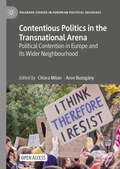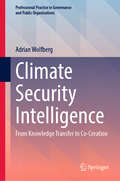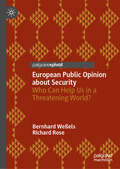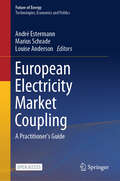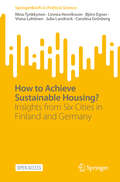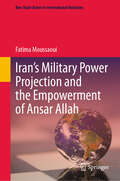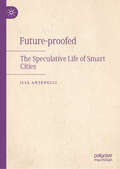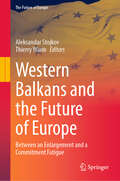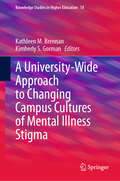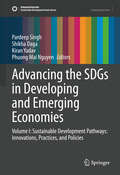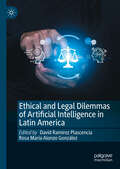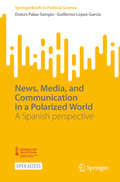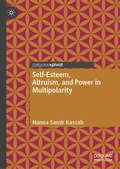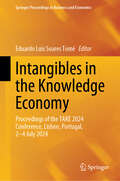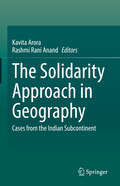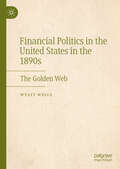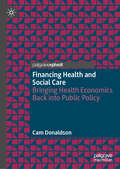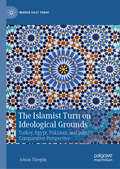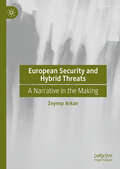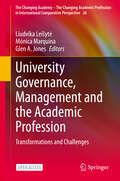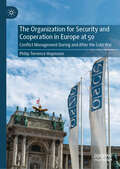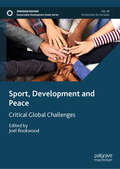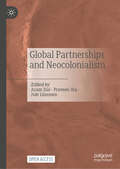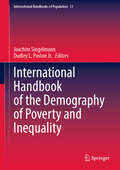- Table View
- List View
Contentious Politics in the Transnational Arena: Political Contention in Europe and its Wider Neighbourhood (Palgrave Studies in European Political Sociology)
by Chiara Milan Aron BuzogányThis Open Access book investigates the transnational dimension of activism — exploring how and why non-state actors scale up contention from the local to the transnational arena, how they translate their grievances and claims into the transnational arena, and how they organize across borders. Moving beyond the analysis of individual campaigns, or a single-country or single-issue focus, which are already well represented in the literature, this volume takes a comprehensive approach. It investigates transnational activities across various policy fields and their respective transnational arenas of contention — namely migration, labour struggles, human rights, and environmental/climate justice — across a range of geographic contexts. Drawing on extensive fieldwork, the contributions in this volume examine cases of transnational contention spanning the EU and its broader neighborhood, from the Western Balkans to the South Caucasus and the Mediterranean. Focusing on European spaces as the arena where civil society actors mobilize, this volume offers insights into their diverse repertoires of contention and discursive strategies, and how they refer to the European Union as the direct or indirect target of their claims. Key cases include grassroots movements, NGO campaigns, pro-European forces, Eurosceptic parties, healthcare and climate justice activism, and the organizational dynamics surrounding migration-related contentious politics. Offering guidelines for future research on civil society actors in the EU and its neighbourhood, this volume is essential reading for scholars and students of political sociology, political science, European studies, as well as practitioners and policy makers concerned with the future of civil society activism in the transnational arena.
Climate Security Intelligence: From Knowledge Transfer to Co-Creation (Professional Practice in Governance and Public Organizations)
by Adrian WolfbergClimate security intelligence is the capacity to warn national and sub-national security organizations of the physical effects of climate change that can have a negative societal effect on nations, governments, and their populations. This book discusses the uniqueness of climate security intelligence, the maturity of its development as a knowledge domain, and its possible future. Written by an intelligence analyst with over forty years of experience, this book centers upon the challenges that organizations may face when analysts, their managers, and their organizations are given the task of warning policymakers and decision-makers about threats to climate security. Taking a necessarily transdisciplinary approach, this book will be of interest to a wide audience of students, researchers, practitioners, and policy-makers concerned with how the impacts of climate change affect the social, cultural, political, and economic stability of national interests.
European Public Opinion about Security: Who Can Help Us in a Threatening World? (Palgrave Studies in European Union Politics)
by Richard Rose Bernhard WeßelsThis book&’s aim is to determine empirically whether Europeans see their multiple security needs best advanced by a consistent reliance on the EU&’s security policies or by differentiating allies according to their capacity to deal with different types of security threats, economic, military, and climate change. It uses original survey data to test whether people see their country facing multiple threats to their security. If they see a threat, do they want their national government to seek help from the EU, the United Nations or NATO or have their national government look after national security on its own? Given substantial differences in public opinion, we test whether this is due to individual differences in their political attitudes and social characteristics; national context; or differences in the capacity of multi-national institutions. The results have important implications for the public policies of national governments and the EU and for theories of European integration.
European Electricity Market Coupling: A Practitioner’s Guide (Future of Energy)
by Louise Anderson André Estermann Marius SchradeThis open access book provides a comprehensive overview of the European Electricity Market Coupling. Tracing the evolution of the EU&’s efforts to create an Internal Energy Market, it explores the history, principles and roles of all key actors from Transmission System Operators (TSOs) to service providers to National Regulatory Authorities (NRAs) in Single Day-ahead and Intraday Coupling. Key topics include the framework of market coupling, the day-ahead and intraday algorithms, procedures, financial settlement, and the viewpoints from traders to interested countries to join the European Electricity Market Coupling in the future. An essential read for industry professionals and scholars alike, this book offers first-hand insights into the practical processes and fundamentals of electricity trading in Europe.
How to Achieve Sustainable Housing?: Insights from Six Cities in Finland and Germany (SpringerBriefs in Political Science)
by Björn Egner Nina Tynkkynen Linnéa Henriksson Viena Lahtinen Julia Landrock Carolina GrönbergThis Brief provides an integrated study of housing and climate policy at the local level. Drawing from an empirical research project across six cities in Finland and Germany, the book explores the degree of integration between housing and climate policy in local government, specifically focusing on the level of awareness of local politicians of the interdependency of the two policy areas. Using document analysis as well as extensive interviews with local politicians, the Brief explains which views local councillors hold about the responsibilities of their municipality in housing and climate policy, how the two fields influence each other and what councillors see as obstacles for joint decision making in both fields. The book looks at housing from a broader perspective, linking housing not only to the number of dwellings, zoning, or construction, but also to the environment, communities and transport. Offering policy advice on how to integrate these sectors and pursue sustainable housing from a holistic perspective, this Brief will be of use to researchers and policymakers interested in housing policy, climate policy, local politics, urban politics, and sustainability. This book is open access, which means that you have free and unlimited access.
Iran’s Military Power Projection and the Empowerment of Ansar Allah (Non-State Actors in International Relations)
by Fatima MoussaouiThe Islamic Republic of Iran, although it has become famous for its foreign policy choices and actions on the international scene, it remains an enigma for the West. This book provides an introspective analysis of the foundation of this unique Islamic state, and reveal what makes it resilient, and attempts to sustain it. Taking a multidisciplinary approach using anthropological, philosophical, psychological, and military grids, the book revisits the power of the clergy and maps out its original meaning and its ability to be wielded to serve policies in line with Iran's contemporary political context. This book will be of interest to students and scholars of military strategy, international security, and geostrategy, as well as military officers and policy makers who will benefit from the fresh perspective it adds to the Western view of a country whose strategic and military thinking is still largely unknown or misunderstood.
Future-proofed: The Speculative Life of Smart Cities
by Ilia AntenucciEfficient, inclusive, sustainable: these are only some of the concepts through which smart cities have been marketed globally, over the past fifteen years at least. But what has really driven smart city projects, governance, and economies? This book argues it is speculation: not merely finance, but a much broader technopolitical force seeking to calculate and shape the future. Smart cities have been testbeds for new technological products, governed through preemptive analytics, and fuelled by high-risk financial investments. Drawing on case studies from Kolkata and Cape Town, this book illustrates how smart city technologies speculate on the future to govern and monetise the present. Today, smart cities might have lost some of their hype already, but their legacies are here to stay, and their ethical and political implications appear more critical than ever. This book offers insights into the speculative forces that undergird urban &‘smartness&’, and into their implications on everyday life, spatial justice, and citizens&’ rights.
The Political Economy of Long-term Planning: Using Strategic Analysis and Foresight to Support Policymaking (Palgrave Studies in the Future of European Societies and Economies)
by Panagiotis E. Petrakis Anna-Maria Kanzola Giorgos VasilisThis book breaks down new ways to use foresight and economic theory to enhance economic planning at a national level. Common economic forecasting models often rely on time-series analysis, which can limit an economist&’s ability to foresee economic outcomes comprehensively. Effective economic planning and policymaking require a deep understanding of the socioeconomic and political forces that shape future economic outcomes. Using an interdisciplinary approach to economic theory and foresight, this book explores a new way to approach economic planning. Emphasizing resilience, adaptability, and future-oriented behavior, this book highlights how policymakers and researchers can integrate foresight and futures methodologies at local and national levels. It explores the methodological challenges inherent in foresight and offers a comprehensive guide to developing and utilizing scenarios. The chapters examine factors related to human thinking and behaviors, demonstrating how this knowledge can be used to support emerging developments across various economies. The Political Economy of Long-term Planning provides resources and management tools to help readers understand economic development using economic foresight. Acknowledging both the challenges and opportunities of long-term planning within developing economies, the authors provide recent case studies from Greece and beyond. Readers will gain a thorough understanding of the political economy of foresight and the essential theories needed to illustrate unique dynamics of socioeconomic change.
Western Balkans and the Future of Europe: Between an Enlargement and a Commitment Fatigue (The Future of Europe)
by Aleksandar Stojkov Thierry WarinOne of the main questions addressed in this book is whether the EU enlargement fatigue has resulted in broken promises leading to a “commitment fatigue” among the EU candidate states from Western Balkans. Until recently, political and business leaders from Western Balkans, almost without exception, have repeatedly highlighted their aspirations for joining the Union. The discussions about future of Europe would be incomplete, without investigating the relations between EU and Western Balkans. This book addresses academic researchers, policy makers, and higher education students.
A University-Wide Approach to Changing Campus Cultures of Mental Illness Stigma (Knowledge Studies in Higher Education #18)
by Kathleen M. Brennan Kimberly S. GormanThis interdisciplinary volume addresses the progress made regarding mental illness stigma in the realm of higher education while acknowledging how stigma has transformed to present more subtle challenges in this context and how it may be addressed to promote positive campus outcomes. Written by researchers and practitioners who representdifferent fields within higher education, it highlights the existence of stigma by focusing on its presence in the curriculum, in policies, and in processes within the university. It discusses both the presence and impact of stigma in undergraduate and graduate studies, athletics, and faculty and staff. The book emphasizes a collaborative approach to involve stakeholder groups across campus by providing practical, preemptive solutions to reduce stigma. This volume can be used as a practical guide for any institution of higher educationwishing to address mental illness stigma on their campus in a strategic, systemic manner. Additionally,it will be helpful for individuals working in higher education as a guide for reflecting on and changing their individual practice.This book greatly appeals to those who are interested in addressing mental illness stigma systemically.
Advancing the SDGs in Developing and Emerging Economies: Volume I: Sustainable Development Pathways: Innovations, Practices, and Policies (Sustainable Development Goals Series)
by Pardeep Singh Shikha Daga Kiran Yadav Phuong Mai NguyenThis contributed volume, the first in a set of two, explores the intersection of innovation and sustainability, investigating how transformative practices across various industries and regions are advancing the Sustainable Development Goals (SDGs). It highlights a wide network of solutions and real-world examples that integrate various SDG principles into business and government strategies. The chapters cover diverse topics, including green finance, human resource management, sustainable marketing, and the adoption of cutting-edge technologies, showcasing how innovation is driving the global transition towards a more sustainable future. The geographic diversity represented in this section—including contributions from Italy, Brazil, Vietnam, India, and Malaysia—provides a rich, multi-regional perspective on sustainable development. The chapters reflect the dynamic ways in which innovation is being harnessed to address pressing global challenges, with a focus on both local and global contexts. Each chapter offers in-depth case studies and practical examples, illustrating how SDG principles are being integrated into various sectors to foster long-term sustainability. Together, these contributions emphasize the critical role of innovative strategies and practices in achieving the SDGs and building a more resilient, sustainable world for future generations.
Ethical and Legal Dilemmas of Artificial Intelligence in Latin America
by David Ramírez Plascencia Rosa María Alonzo GonzálezThis book analyzes the potential benefits of using artificial intelligence to surpass traditional social and economic problems in Latin America, but it also looks to understand the perils and barriers derived from the adoption of this technology. This volume is divided in Section 1. &“Considering AI in the private sphere&” that debates about the employment of artificial intelligence from the citizen&’s perspective. It embraces topics related with the introduction of AI in the media and the labor market, and how Latin Americans perceive, engage and mobilize before the rising presence of AI in their daily lives. Section 2. Challenges and promises of AI in the public sector centers on the ethical and legal controversies triggered by the incorporation of artificial intelligence in the public sphere. It focuses on the promising benefits of introducing AI in the public administration, education and public security, but also the latent impacts on human rights.
News, Media, and Communication in a Polarized World: A Spanish perspective (SpringerBriefs in Political Science)
by Guillermo López-García Dolors Palau-SampioThis Open Access book provides an in-depth analysis of the role held by media and journalists in a fragmented and polarized communication ecosystem that faces the uncertainty of major challenges, such as the impact of the disintermediation process, the pressure of simultaneous over- and disinformation forces, and labor precariousness. It discusses these challenges in the context of business model crises and the loss of journalistic quality. Following an interdisciplinary approach, the book further explores the interaction between communication and political and social change processes, their implications, and their consequences in a hybrid media context. The book examines the loss of credibility of traditional media and democratic institutions and discusses how trust can be restored. While doing so, it appeals to the innate link between journalism and democracy, based on the public&’s trust in the capacity of the media to provide quality content that allows citizens to make informed decisions. As the rise of disinformation presents an incredible challenge for conventional media, due to their position of extreme vulnerability, the book finally analyzes how media and professional journalists, who have traditionally held the responsibility of providing quality information, have to address these issues, while facing the disintegration of former business models and social credibility. This book will appeal to students, scholars, and researchers of political communication, journalism, political science, and related fields, as well as policy-makers and professionals interested in a better understanding of the role of media and journalists in contemporary political and social change processes.
Self-Esteem, Altruism, and Power in Multipolarity
by Hanna Samir KassabThis book asserts that state identities drive state motivations shaping state behavior. It describes several state motivations connected to self-esteem and identity: economic wealth, identity dominance through altruism, and controlling political outcomes for other states otherwise understood as decisionism. Part of this process is getting other states to acknowledge and recognize this self-image. As a result, self-esteem is at the core of state motivations, and seeks to connect the ideational with material reality. For instance, status quo powers, for instance the United States, will maintain their system because it is their system. On the other hand, revisionist powers like China and Russia will be motivated to amend or even overturn the system given their own understandings of self and self-esteem. Revisionist states may feel oppressed by an unfair or unjust international system, having exceptionalist identities of their own long supplanted by the United States. Feelings of humiliation define self-esteem and the need to overturn the system may be defined by these negative experiences. This book then adopts a constructivist framework of analysis and argues that narratives, identities, and whole realities are created through a cogent process of mutual constitution.
Intangibles in the Knowledge Economy: Proceedings of the TAKE 2024 Conference, Lisbon, Portugal, 2–4 July 2024 (Springer Proceedings in Business and Economics)
by Eduardo Luis Soares ToméThis book features selected chapters from the proceedings of the Multidisciplinary Conference on Intangibles (TAKE), held in Lisbon, Portugal, in July 2024. The chapters cover a wide range of topics , including human resource development, intellectual capital, knowledge management, logistics, retailing, public policy, innovation and entrepreneurship, business models, competitiveness, and accounting. The book is a valuable resource for researchers, practitioners, and industry experts interested in shaping the future of the knowledge economy.
The Solidarity Approach in Geography: Cases from the Indian Subcontinent
by Kavita Arora Rashmi Rani AnandThis contributed volume explains the concept of solidarity and illustrates how perspectives informed by a solidarity approach can be utilized in geographic research. Geography offers a set of concepts and tools including space, place, scale, landscape, and mobility, that makes it a particularly useful lens through which to view issues of solidarity. It is distinct from other sciences in its subject matter and methodology but at the same time offers a multidisciplinary approach and transcends its disciplinary boundary. The concept of solidarity in geography is illustrated here through nearly thirty-five case chapters, all from the Indian subcontinent. Topics covered here include but are not limited to geographical approaches to solidarity in economic issues, indigenous knowledge, international relations, global geopolitics, climate change, crisis management, human health, and more.
Financial Politics in the United States in the 1890s: The Golden Web
by Wyatt WellsIn the 1890s, the choice between the gold standard and the free coinage of silver upended American politics. The gold standard linked the United States to the larger international financial system, in which gold was the common denominator. The free coinage of silver would effectively sever these ties by devaluing the dollar. The gold standard allowed the U.S. to secure vast amounts of foreign capital on good terms to build railroads and develop industry, but at the cost of deflation. The free coinage of silver would raise prices, particularly for cotton and wheat, whose cultivators carried heavy debts and were hard-pressed. The struggle would define the United States. Would it continue to develop industrially, or would it return to its agricultural roots? The combatants—among them Grover Cleveland, William Jennings Bryan, J.P. Morgan, and William McKinley—understood what was at stake. This book deals both with well-known aspects of the contest, such as the 1896 Presidential election between McKinley and Bryan, and lesser-known ones, such as how the currency issues interacted with racial politics and international negotiations over the role of silver in the world&’s monetary system. The result is the most comprehensive account of financial politics in the United States in the 1890s yet published.
Financing Health and Social Care: Bringing Health Economics Back into Public Policy
by Cam DonaldsonWhy do most capitalist economies have socialist health care systems? How can we preserve them? What would Aneurin Bevan think? These are the three main questions addressed by this book. In the 1950s, through In Place of Fear, Bevan made a strong case for a National Health Service which he had been instrumental in establishing in the UK in 1948. But he did not articulate the accompanying economic case. That case is presented here in an accessible way and extended to social care. A comprehensive understanding of &‘tried and tested&’ means of financing health care is presented, alongside assessments of repeated and new approaches proposed in policy circles as quick fixes to funding shortfalls. This is tackled across four themes: the role of the private sector; making choices in the face of resource scarcity; workforce planning and remuneration; and preparation for pandemics. The emerging proposals carry a cost to the public purse, but must be weighed against the costs and unfairness of further disintegration. With a special focus on the UK and the NHS at a critical time for policy change, this essential book provides the blueprint for policymakers, clinical leadership and politicians needing to pay more attention to the economic issues underlying health and social care as they shape In Place of Fear 2.0.
The Islamist Turn on Ideological Grounds: Turkey, Egypt, Pakistan, and Iran in Comparative Perspective (Middle East Today)
by Adnan TüregünMany states in the Islamic Middle East, North Africa, and South Asia that had previously experienced some measure of secularism turned to Islam in the late 20th and early 21st centuries. In so doing, they have changed the political landscape of their nations and the entire region, also significantly influencing international politics. The Islamist Turn outlines, explains, and demonstrates this change. And, on all three counts, the book fills an important gap in our collective knowledge by developing a typology of Islamist turns based on the institutional aspect of the change; offering an ideational explanation of the turns with an emphasis on the political ideologies and strategies of rulers; and studying the cases of Turkey, Egypt, Pakistan, and Iran as exemplary of the Islamist turns in the region.
European Security and Hybrid Threats: A Narrative in the Making
by Zeynep ArkanHybrid threats have been defined in various ways by different security actors, with their scope continuously expanding to encompass emerging insecurities within the evolving security environment. As an umbrella term encompassing a wide spectrum of threats with complex and multidimensional features, the notion of hybrid threats remains inherently vague and amorphous. This lack of clarity presents significant challenges for policymakers, who must constantly identify potential dangers, anticipate risks, and formulate effective responses to safeguard their polities and populations. Consequently, a persistent sense of insecurity has become a defining characteristic of the current European security landscape. This &‘new normal&’ of European security is characterised by a series of &‘(un)known unknowns&’ that fall under the elusive concept of hybrid threats. However, rather than accepting this evolving security paradigm at face value, this study calls for a critical examination of its underlying assumptions, core concepts, and broader political implications. It argues that the hybrid threat narrative demands a re-evaluation of what security means in contemporary Europe and how it is operationalised. Moreover, the study underscores the expansive nature of the hybrid threat framework, which has the potential to include virtually any domain – ranging from education and technology to research and public infrastructure – thereby contributing to the securitisation of all aspects of social and political life. This expansive and ambiguous framing raises important questions about the limits of security and allocation of resources, carrying considerable implications for democratic governance in Europe. Dr Zeynep Arkan<span lang="EN-GB" style="font-size: 11.0pt; mso-ascii-font-family: Calibri; mso-ascii-theme-font: minor-latin; mso-fareast-font-family: 'Times New Roman'; mso-hansi-font-family: Calibri; mso-hansi-theme-font: minor-latin; mso-bidi-font-family: Calibri; mso-bidi-theme-font: minor-latin; color: #1f3864; mso-themecolor: accent1; mso-themeshade: 128; mso-ansi-language
University Governance, Management and the Academic Profession: Transformations and Challenges (The Changing Academy – The Changing Academic Profession in International Comparative Perspective #26)
by Glen A. Jones Liudvika Leišytė Mónica MarquinaThis volume investigates governance and management of higher education through the lens of the academic profession. Drawing on data from the Academic Profession in the Knowledge-based Society project, an international collaborative research study involving the administration of a common survey to faculty in more than twenty countries, this volume explores important issues of governance and management in relation to, and frequently from the perspective of, the academic profession. It analyzes the complex inter-relationships and intersections between decision processes and structures at both the system and institutional levels and the experiences and perceptions of the academics who play a central role in fulfilling the mission of higher education. Theoretical chapters review key concepts that have grounded the analysis of external (system-level) and internal (institution-level) governance, while the core chapters provide original empirical research, many involving comparative studies, exploring key challenges such as managerialism, gender, shifts in faculty perceptions of influence, and the importance of communication and institutional leadership. Chapter 4,10,11 and 12 of this book are available open access under a CC BY 4.0 license at link.springer.com.
The Organization for Security and Cooperation in Europe at 50: Conflict Management During and After the Cold War
by Philip Terrence HopmannThis book traces the development of the OSCE from the opening of negotiations in 1973 of the Helsinki Final Act up to its 50th anniversary in 2025, focusing on the transition from a bridge between Eastern and Western Europe (and the US and Canada) during the final 15 years of the Cold War to its post-Cold war focus on managing conflicts in the post-communist regions of Europe after the Cold War. It analyzes developments in this region as a competition between realist and liberal/institutionalist ideas, arguing that the OSCE was constructed by its participating states as a liberal international institution that has succumbed to a renewal of "realist" ideas and actions that have reappeared in the first 25 years of the 21st century and have thereby threatened its effectiveness in enhancing security, cooperation and peace in Europe, culminating with the Russian invasion of Ukraine.
Sport, Development and Peace: Critical Global Challenges (Sustainable Development Goals Series)
by Joel RookwoodThis volume offers a comprehensive exploration of the rapidly evolving landscape of Sport for Development and Peace (SDP), a critical approach to peacebuilding, economic development, and social transformation gaining increasing stature during the last twenty-five years. Contributors here scrutinize the diversification in SDP methods and ideals, spotlighting global dimensions and differences in this burgeoning field. Encompassing contributions from scholars across five continents, the chapters illuminate diverse approaches and analyses, reflecting a variety of viewpoints and experiences. The volume highlights the heterogeneity within SDP and assesses the trajectory of SDP studies, while also identifying common threads among seemingly disparate approaches. Further, it investigates sport's role in responding to global challenges, from financial crises to the COVID-19 pandemic, climate change, and conflicts, and although sport is often recognized for its potential to foster peace and development, this book navigates the intricate complexities and contradictions that can arise in the practice of harnessing sport for these goals. With 14 engaging chapters, the book delves into a range of topics, including critical analyses of different SDP approaches, the sustainability of sport initiatives, alignment of SDP with sustainable development goals, and the use of sport in refugee resettlement. It also examines sport's contribution to societal outcomes like health, education, inequality reduction, and peace, while discussing challenges faced in the field. Moreover, the volume explores the connections between SDP and indigenous philosophies, feminism, local community development, and issues of violence within prisons. Offering a holistic view of SDP's evolution and impact, presenting fresh perspectives as well as critical insights for scholars, practitioners, and policymakers in the realm of international sport, development, and peacebuilding, this volume marks itself an essential resource for understanding the multifaceted landscape of SDP.
Global Partnerships and Neocolonialism
by Praveen Jha Aram Ziai Jule LümmenThis open access book points at some of the problematic aspects of international partnerships that continue to be shaped by colonialism. A &“global partnership for sustainable development&” is the 17th of the Sustainable Development Goals (SDGs). However, research points to shortcomings and problematic aspects of international partnerships that have been shaped by colonialism and continue to reflect unequal power relations between the global North and South. Hence, the chapters of this edited volume explore how global partnerships can be established in a neocolonial environment in the fields of development cooperation, the global economy and knowledge production. The contributions were written by members of the Global Partnership Network (GPN), one of the Centres of Excellence for Exchange and Development funded by the German Ministry for Development Cooperation, which has been working intensively and critically on the topic of partnerships and North-South relations over the past four years.
International Handbook of the Demography of Poverty and Inequality (International Handbooks of Population #13)
by Dudley L. Poston Jr. Joachim SingelmannThis handbook provides a comprehensive and comparative review of poverty and inequality in developing and developed countries from demographic, sociological, and political perspectives. It discusses, among others, the basics of poverty and inequality, issues of poverty and inequality among race/ethnic and sexual minority subpopulations, social processes, country and comparative perspectives, child poverty, and anti-poverty policies. It also touches on regional disparities. There has been rapid decline in poverty and inequality in China, East Asian and Pacific countries. Declines have also occurred in South Asia. But in Sub-Saharan Africa, poverty and inequality have risen in some countries, while in other regions, such as transition economies in Europe and Central Asia, only modest changes have occurred. This handbook provides a great reference for demographers, social scientists, policy makers and NGOs.
